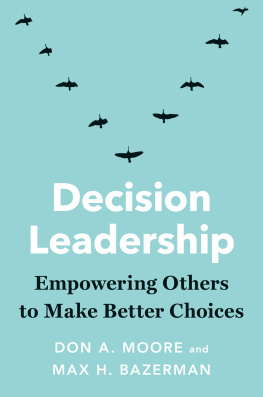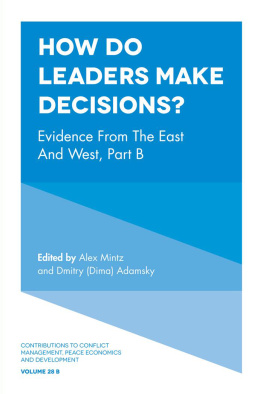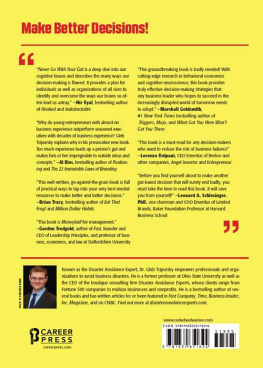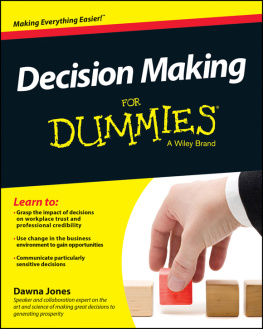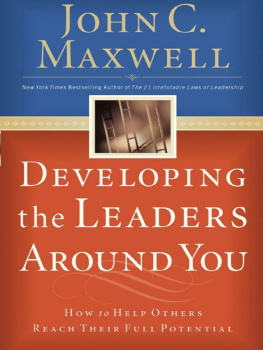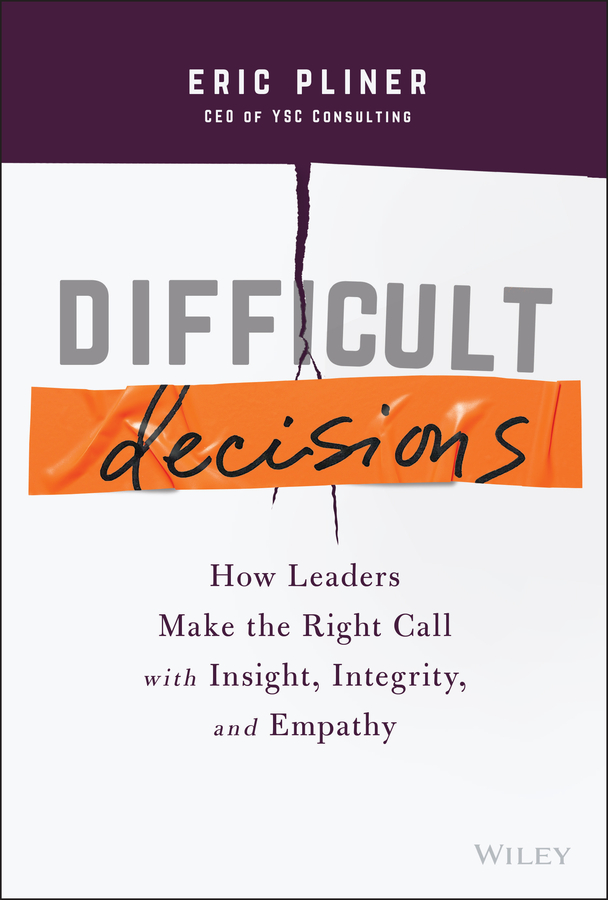
Table of Contents
Guide
List of Illustrations
- Chapter 2
- Chapter 5
- Chapter 7
Pages
ERIC PLINER
CEO OF YSC CONSULTING
DIFFICULT decisions
How Leaders Make the Right Call with Insight, Integrity, and Empathy

Copyright 2022 by Young Samuel Chambers Ltd. All rights reserved.
Published by John Wiley & Sons, Inc., Hoboken, New Jersey.
Published simultaneously in Canada.
No part of this publication may be reproduced, stored in a retrieval system, or transmitted in any form or by any means, electronic, mechanical, photocopying, recording, scanning, or otherwise, except as permitted under Section 107 or 108 of the 1976 United States Copyright Act, without either the prior written permission of the Publisher, or authorization through payment of the appropriate per-copy fee to the Copyright Clearance Center, Inc., 222 Rosewood Drive, Danvers, MA 01923, (978) 750-8400, fax (978) 646-8600, or on the Web at www.copyright.com. Requests to the Publisher for permission should be addressed to the Permissions Department, John Wiley & Sons, Inc., 111 River Street, Hoboken, NJ 07030, (201) 748-6011, fax (201) 748-6008, or online at http://www.wiley.com/go/permissions.
Limit of Liability/Disclaimer of Warranty: While the publisher and authors have used their best efforts in preparing this work, they make no representations or warranties with respect to the accuracy or completeness of the contents of this work and specifically disclaim all warranties, including without limitation any implied warranties of merchantability or fitness for a particular purpose. No warranty may be created or extended by sales representatives, written sales materials or promotional statements for this work. The fact that an organization, website, or product is referred to in this work as a citation and/or potential source of further information does not mean that the publisher and authors endorse the information or services the organization, website, or product may provide or recommendations it may make. This work is sold with the understanding that the publisher is not engaged in rendering professional services. The advice and strategies contained herein may not be suitable for your situation. You should consult with a specialist where appropriate. Further, readers should be aware that websites listed in this work may have changed or disappeared between when this work was written and when it is read. Neither the publisher nor authors shall be liable for any loss of profit or any other commercial damages, including but not limited to special, incidental, consequential, or other damages.
For general information on our other products and services or for technical support, please contact our Customer Care Department within the United States at (800) 762-2974, outside the United States at (317) 572-3993 or fax (317) 572-4002.
Wiley publishes in a variety of print and electronic formats and by print-on-demand. Some material included with standard print versions of this book may not be included in e-books or in print-on-demand. If this book refers to media such as a CD or DVD that is not included in the version you purchased, you may download this material at http://booksupport.wiley.com. For more information about Wiley products, visit www.wiley.com.
Library of Congress Cataloging-in-Publication Data:
Names: Pliner, Eric, author.
Title: Difficult decisions : how leaders make the right call with insight, integrity, and empathy / Eric Pliner.
Description: Hoboken, New Jersey : Wiley, [2022] | Includes index.
Identifiers: LCCN 2021062105 (print) | LCCN 2021062106 (ebook) | ISBN 9781119817048 (cloth) | ISBN 9781119817086 (adobe pdf) | ISBN 9781119817062 (epub)
Subjects: LCSH: Decision making. | Leadership.
Classification: LCC HD30.23 .P554 2022 (print) | LCC HD30.23 (ebook) | DDC 658.4/03dc23/eng/20220118
LC record available at https://lccn.loc.gov/2021062105
LC ebook record available at https://lccn.loc.gov/2021062106
Cover image: Getty Images | Miragec
Cover design: Paul McCarthy
For Jonathan
Preface
Writing Wrong
This book is wrong.
I don't mean that it's bad or evil. I mean that it's inevitably incorrect.
There is content within these pages with which you are bound to disagree. Your view isn't necessarily right; but then, neither is mine. Nevertheless, some of what I have to say is undoubtedly just plain wrong.
Much of what is contained herein has been examined in various settings for literal millennia. And stillor perhaps inevitablynot everyone sees it the same way. For instance, one fundamental tenet of this book's core frameworkthat morals are internally referenced and externally influenced, while ethics are externally referenced and distilled internallyruns in direct contradiction to the starting point of plenty of brilliant thinkers in the field. (A pair of ethicists, one in the UK and one in Australia, use definitions in their shared writing that are almost exactly opposite to mine.)
Discussions of right and wrong, of good and evil, of fairness and injustice are all deeply personal; they are also contextual and time bound. As a result, some of what I write with certainty today (and much of what I write with uncertainty) is bound to be easily discarded, depending on things like where and when you live, how you are encountering this text, and your reasons for reading it. That is the paradox of insisting that how we make the most difficult decisions must always be contextual.
Add to this the complication of your specific, current leadership context, with responsibility for the well-being, satisfaction, engagement, productivity, happiness, or work/life conditions of an increasingly crowded array of stakeholders, plus the fact that morality and ethics are inherently subjective and ever-evolving, as is our understanding of what it means to lead. All that complexity equals a high degree of likelihood that this book doesn't have clear answers, that it's wrong, or that the apparent answers that seem clear and right today will seem muddy and incorrect far sooner than I or my publisher would like.
I still think it's worth writing, and hopefully you still think it's worth reading. Here's why.
We define leadership strategy as the intentional design of the individual styles, the dynamics and interactions, and the collective cultures that create the conditions for others to deliver desired change. Whether that desired change is increased profit or market share, entry into a new geography, election of a new office holder to state or federal government, development of a new and evocative artistic experience, corralling community resources for greater equity in their distribution, or something else entirely, leaders make it possible (create the conditions) for people working together (others) to drive results, outcomes, or impact (deliver desired change). That's a tall task, and it's one that's best not left to chance (intentional design). After all, we have organizational strategies and financial strategieswhy wouldn't we have leadership strategies, too?
Intentional design of those leadership strategies requires understanding where we've come from, who and where we are today, how we got here, where we want to go, and how we'd like to get there. That's the part where thinking about how to make the most difficult decisions before we're actually faced with them has the most potential to be useful. Given the sheer number of difficult decisions that leaders have to make every day, the pace required of that decision-making, and the seemingly higher and higher stakes of those decisions, clarifying an approach by design rather than by default leaves us more ready to deal with challenges we've never encountered previouslylike a global pandemic or unprecedented economic disruption or irreversible changes to our physical climate or a woefully unreliable supply chain or bans on international travel or the
Next page

